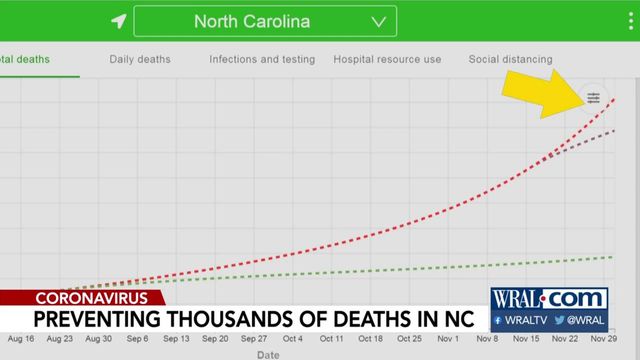Model from University of Washington predicts 10,000 coronavirus deaths in NC if people stop wearing masks
A new prediction from the University of Washington showed the potential outcomes of two scenarios: one where people continue wearing masks, and one where that requirement is eased.
Posted — UpdatedWe all have the power to save lives during this pandemic -- thousands of lives, in fact.
All we need is a mask.
A new prediction from the University of Washington showed the potential outcomes of two scenarios: one where people continue wearing masks, and one where that requirement is eased.
This red and green on the graph from the University of Washington is applied. The red line showed what health experts want to stop, a climbing death rate in North Carolina by December 1 if mask-wearing requirements are eased. The green line showed where those health experts want us to go, with 95% of people wearing masks.
"One of the things the science agrees on is that masks do reduce the transmission of the virus," explained Mark Holmes, with UNC Gillings School of Global Public Health.
Holmes pointed out that a lot has been learned about this virus in a short amount of time.
"Another thing we've learned from this virus over the past few months is that prediction is hard," he said.
Hard because of so many variables, not only predicting how the virus will act but how people and treatments will react as well.
It does provide some guidance on this. To the degree of magnitude, it shows you the kind of effect you might expect which is sizable in this case.
Friday is day 151 of the COVID-19 response at the state Emergency Operation Center.
At a presentation on the state’s coronavirus situation Friday, NCEM director Mike Spraybery reiterated the best possible course to navigate the pandemic.
"Wear a face covering. Wait six feet apart and wash your hands to prevent the spread of COVID-19," said Sprayberry.
Holmes pointed out December is a long way away, so think about this like a hurricane track.
The further out the prediction goes, the harder it is to be precise.
Related Topics
• Credits
Copyright 2024 by Capitol Broadcasting Company. All rights reserved. This material may not be published, broadcast, rewritten or redistributed.





